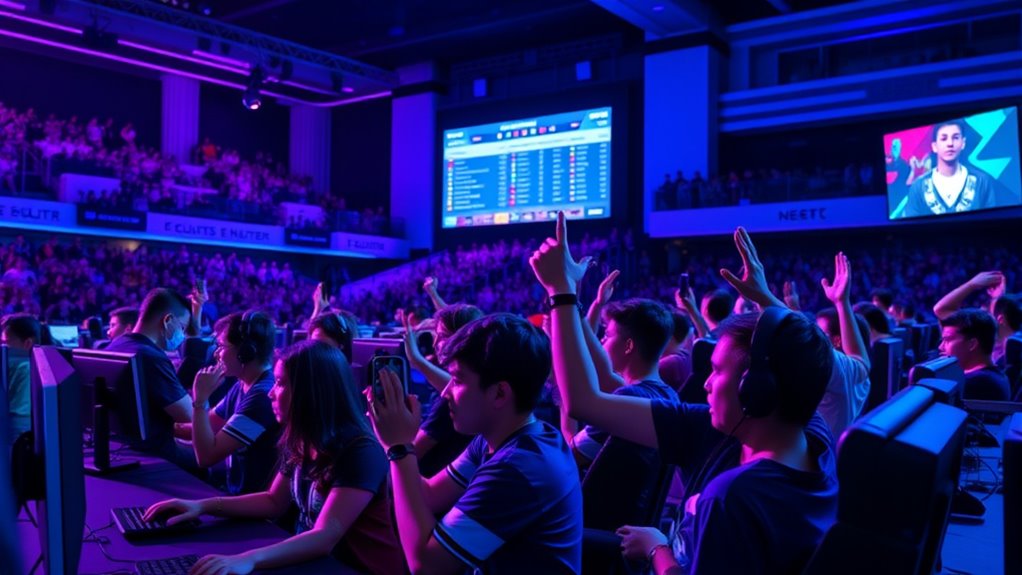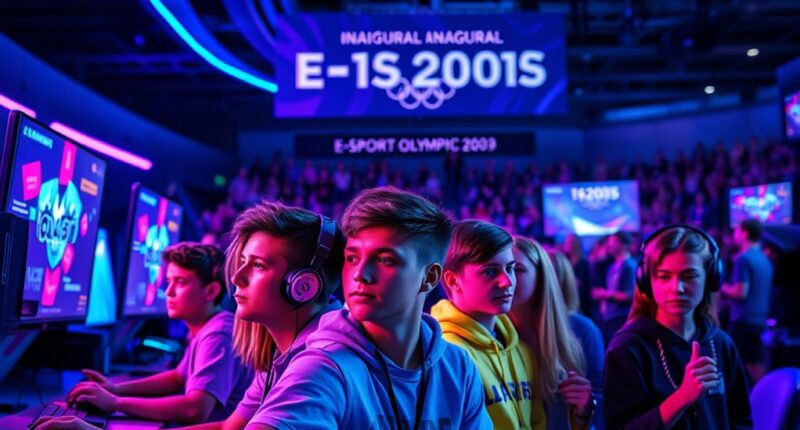Gaming creates strong communities where you build real friendships, find emotional support, and share your identity. It also encourages social activism, allowing you to raise awareness for causes and organize virtual campaigns. Playing can boost your mental health by providing stress relief and promoting teamwork, especially in e-sports. The upcoming E‑Sports Olympics highlights how competitive gaming fosters resilience and confidence. To explore how these connections shape lives and society, stay with us for more insights.
Key Takeaways
- Online gaming communities foster meaningful relationships, emotional support, and safe spaces for self-expression across global players.
- Gaming platforms serve as tools for social activism, raising awareness and mobilizing communities for social and political causes.
- E-sports competitions promote teamwork, discipline, and confidence, boosting players’ mental resilience and personal growth.
- Participation in gaming can improve mental health by providing stress relief, though excessive gaming may lead to social withdrawal.
- The upcoming E‑Sports Olympics exemplifies the growing influence of competitive gaming on community engagement and individual achievement.

Gaming has become a powerful force shaping social interactions in ways that were unimaginable a few decades ago. When you immerse yourself in your favorite online multiplayer game, you’re not just playing; you’re forging connections that transcend physical boundaries. Virtual friendships sprout quickly, often feeling as genuine as those formed in real life. You might find yourself chatting with someone from halfway around the world, sharing strategies, jokes, and life stories. These relationships can offer emotional support, companionship, and a sense of belonging that’s sometimes hard to find elsewhere. You may even discover that gaming communities serve as safe spaces for expressing yourself, especially if you’re part of marginalized groups. In this way, gaming becomes more than entertainment; it’s a platform for building meaningful bonds.
Moreover, gaming increasingly plays a role in online activism. You might notice campaigns or movements gaining momentum through gaming platforms, where players rally around social or political causes. For example, some games incorporate themes that promote awareness about climate change, social justice, or mental health. As a gamer, you can participate in these efforts by spreading messages, organizing virtual events, or supporting charity streams. Gaming communities have the power to mobilize large groups quickly, amplifying voices that might otherwise go unheard. When you use your gaming skills and networks for activism, you’re helping to foster change beyond the screen. This integration of gaming and activism demonstrates how digital spaces can be harnessed for positive impact, turning entertainment into a catalyst for social progress. Additionally, the rise of preppy dog names reflects how cultural trends influence naming choices, highlighting the importance of identity and style within communities.
Your involvement in gaming also influences mental health in both positive and negative ways. On one hand, playing can serve as a stress reliever, offering a break from daily pressures and a way to unwind. On the other hand, excessive gaming might lead to issues like social withdrawal or anxiety. Recognizing these effects helps you develop healthier gaming habits. Many online communities now promote mental health awareness, encouraging players to seek help if needed and to balance gaming with other aspects of life. The emergence of e-sports and competitive gaming also impacts mental health by fostering teamwork, discipline, and goal-setting, which can boost confidence and resilience. Participating in or watching e-sports events, like the upcoming E‑Sports Olympics, can inspire you to pursue your own goals and develop a sense of achievement.
Frequently Asked Questions
How Do Online Gaming Communities Influence Real-Life Social Skills?
Online gaming communities can boost your social skills by fostering virtual friendships. As you chat, strategize, and collaborate with others, you learn communication, teamwork, and problem-solving. These interactions help you develop confidence and empathy, which translate into real-life situations. By engaging regularly, you strengthen your social skills, making it easier to connect with people outside the game and build meaningful relationships, both online and offline.
What Mental Health Challenges Are Associated With Competitive Gaming?
You might find yourself battling performance anxiety, feeling like the pressure to win is sky-high and impossible to escape. Competitive gaming can also lead to burnout symptoms, making you feel exhausted, irritable, and drained even after a quick match. These mental health challenges can sneak up on you, turning your passion into stress and frustration. It’s essential to recognize these signs early and take breaks to keep your mental game strong.
How Do E-Sports Olympics Affect Traditional Sports Recognition?
E-sports Olympics boost traditional sports recognition by highlighting competitive skill and global appeal, sparking a traditional sports rivalry. You see, esports sponsorships grow as more brands invest in these events, legitimizing them alongside traditional sports. This shift encourages fans and athletes to view esports as a serious, competitive arena, ultimately elevating the status of both fields and fostering healthy competition between conventional sports and the emerging digital athleticism.
Are There Privacy Concerns in Gaming Communities During Large Events?
Imagine you’re at a gaming event in the age of the internet, and yes, privacy concerns are real. During large esports tournaments, data privacy issues and cybersecurity threats can target players and viewers alike. You should be aware that personal information might be vulnerable to hacking or misuse, so safeguarding your data is essential. Always use secure connections and strong passwords to protect yourself from potential cyber threats during these massive gatherings.
How Is Inclusivity Promoted Within Global Gaming Competitions?
You’re encouraged to promote inclusivity in global gaming competitions through diversity initiatives that celebrate different backgrounds and skill levels. Accessibility innovations, such as customizable controls and visual aids, make participation easier for everyone. By fostering an environment that values all players, organizers guarantee a more welcoming and equitable experience, helping to break down barriers and bring diverse communities together in the spirit of healthy competition and shared passion.
Conclusion
As you dive deeper into gaming’s evolving world, you realize it’s more than just entertainment—it’s shaping communities and mental health in ways you never imagined. With the rise of e-sports and global competitions, the stakes are higher than ever. But what’s coming next? Will these digital worlds foster connection or create new divides? The future of gaming’s social impact remains uncertain, leaving you on the edge of discovery, enthusiastic to see what’s next.









